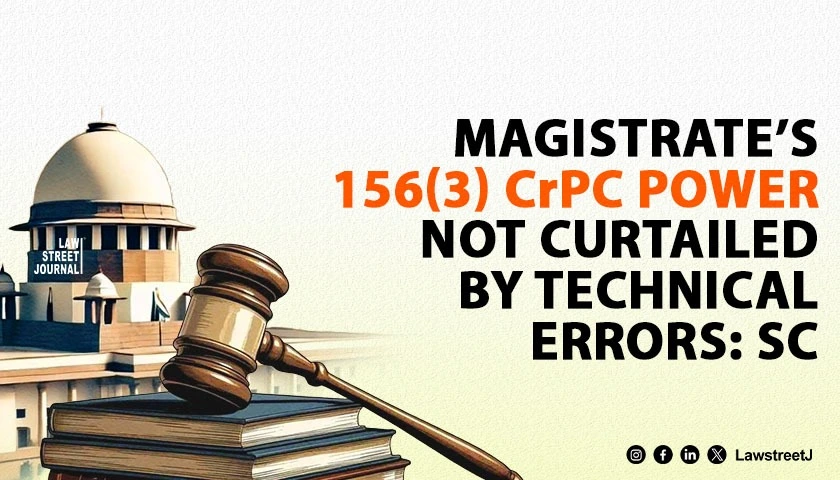New Delhi: In a significant reaffirmation of the scope of judicial powers under Section 156(3) of the Code of Criminal Procedure, 1973, the Supreme Court of India has held that when a Magistrate refers a private complaint for police investigation after finding prima facie material disclosing a cognizable offence, such referral cannot be invalidated on mere technical or linguistic errors.
The Bench comprising Justice Pankaj Mithal and Justice Ahsanuddin Amanullah, in its judgment, restored an FIR quashed by the Karnataka High Court and directed police authorities to expeditiously complete the investigation into allegations of forgery and fabrication of a fake e-stamp paper and rent agreement. The apex court held that the High Court erred in quashing the probe where prima facie cognizable offences were made out.
The decision underscores that Magistrates’ directions under Section 156(3) form a crucial part of the criminal process to ensure genuine grievances are not stifled at the threshold.
The appellant, Sadiq B. Hanchinmani, had filed a private complaint before the Judicial Magistrate First Class-III, Belagavi, alleging that certain private respondents—Veena, Chandrumal Parchani, and others—colluded to forge and produce a fabricated rent agreement before the Karnataka High Court to mislead proceedings concerning ownership of ancestral property.
According to the complaint, the alleged rent agreement, dated 20 May 2013, was executed on an e-stamp paper later discovered to be fake. Upon verification through the Inspector General of Registration and Commissioner of Stamps, Bengaluru, it was revealed that the same e-stamp serial number had been used earlier in an unrelated sale transaction, confirming the document was forged.
Acting on the complaint, the JMFC referred the matter for investigation under Section 156(3) CrPC, leading to registration of Crime No. 12/2018 at Khade Bazar Police Station, Belagavi, for offences under Sections 120-B, 201, 419, 420, 468, and 471 IPC.
However, two Single-Judge Benches of the Karnataka High Court (Dharwad Bench) quashed the Magistrate’s referral orders through judgments dated 24 July 2019 and 18 November 2021, holding that the Magistrate had not applied judicial mind while directing “further investigation.”
Setting aside both High Court orders, the Supreme Court found that the JMFC’s reasoning was sound and well-founded, as the complaint contained specific allegations backed by prima facie material pointing to forgery, conspiracy, and use of counterfeit documentation.
“The Magistrate had rightly referred the matter for investigation to the police since a prima facie case stood made out against the accused in view of the material available,” the Bench observed.
The Court noted that the High Court had misunderstood the Magistrate’s use of the word “further” in its order dated 18 January 2018. The phrase, the Bench explained, did not imply post-cognizance ‘further investigation’ under Section 173(8) but was simply used in a general sense while ordering investigation under Section 156(3).
Accordingly, the Court held that a mere linguistic lapse cannot nullify judicial intent, especially when the Magistrate’s order demonstrates application of mind and material disclosure of cognizable offences.
The Bench went on to detail the fraudulent conduct underlying the case. The alleged “rent agreement,” executed between accused No. 1 and 2, was embossed on an e-stamp paper numbered IN-KA82473995873571L, dated 20 May 2013.
Upon verification by the Registration Department, it was found that this number corresponded to an unrelated sale agreement between J.D. Duradundi and S.B. Janagouda. This discrepancy, the Court observed, was a clear indication of fabrication.
The forged document was used before the High Court to falsely represent lawful possession and to obtain favourable interim orders in an ongoing civil dispute. The Supreme Court noted that such conduct not only affects private parties but also undermines the sanctity of judicial proceedings.
The Court emphasized that the Magistrate’s discretion under Section 156(3) operates at the pre-cognizance stage and is a critical mechanism to safeguard justice where police inaction or private evidence suggests serious wrongdoing.
“Enough material was available to justify a full-fledged police investigation. When the facts disclose commission of a cognizable offence, the High Court must refrain from stifling investigation at a nascent stage,” the Bench stated.
The Court also reiterated the distinction between Sections 156(3) and 202 CrPC, noting that the former is intended to trigger investigation before cognizance, while the latter applies once the Magistrate has taken cognizance but seeks further verification before issuing process.
Case Title: Sadiq B. Hanchinmani v. State of Karnataka & Others
Case Nos.: Criminal Appeal Nos. — of 2025 (arising out of SLP (Crl.) Nos. 11336 / 2022 & 39619 / 2022)
Coram: Justice Pankaj Mithal and Justice Ahsanuddin Amanullah
Date of Judgment: November 4, 2025
Citation: 2025 INSC 1282
For Petitioner(s): Mr. Shailesh Madiyal, Sr. Adv., Mr. Rohit Kumar Singh, AOR, Ms. Divija Mahajan, Adv., Ms. Nishi Singh, Adv., Shweta Priyadarshini, AOR, Mr. Shikhar Gupta, Adv., Mr. Shubham V. Gawande, Adv.
For Respondent(s): Mr. Prateek Chadha, A.A.G. (argued by) Mr. D. L. Chidananda, AOR, Mrs. Barathi Raju, Adv., Ms. Vasundhara Raju, Adv., Mr. M. A. Chinnasamy, AOR, Mr. C. Raghavendren, Adv., Mrs. C. Rubavathi, Adv.











